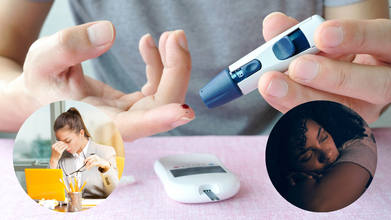- Health Conditions A-Z
- Health & Wellness
- Nutrition
- Fitness
- Health News
- Ayurveda
- Videos
- Medicine A-Z
- Parenting
This Amazing Ayurvedic Herb Can Prevent Formation Of Kidney Stones

Credit: Canva
Shatavari, scientifically known as Asparagus racemosus, is a member of the asparagus family and is widely used in Ayurvedic medicine as a rejuvenating herb. Known for its adaptogenic properties, it is believed to help the body cope with physical and emotional stress. Traditionally, Shatavari has been used to enhance vitality and overall health. Below, we explore the various health benefits associated with this powerful herb.
Potential Health Benefits of Shatavari
1. Rich in Antioxidants
Shatavari is high in saponins, compounds with strong antioxidant properties that help combat oxidative stress and prevent cellular damage. Research has identified several antioxidants in Shatavari root, including racemofuran, asparagamine A, and racemosol, which may contribute to its protective effects against chronic diseases.
2. Possesses Anti-Inflammatory Properties
Racemofuran, a compound found in Shatavari, exhibits anti-inflammatory properties similar to COX-2 inhibitors—prescription medications that reduce inflammation with fewer digestive side effects.
3. Boosts Immunity
Shatavari has been traditionally used in Ayurveda as an immunity booster. Animal studies suggest that its root extract increases antibody production and enhances immune responses, potentially aiding in faster recovery from infections.
4. Helps Relieve Cough
Shatavari root juice has been used as a natural cough remedy in India. Research on mice indicates that its extract is as effective as prescription cough medicine in suppressing cough reflexes.
5. May Aid in Diarrhea Management
Shatavari has been used in traditional medicine to treat diarrhea, which can lead to dehydration and electrolyte imbalances. Studies on rats suggest that it helps reduce symptoms of diarrhea, though further human research is needed.
6. Acts as a Natural Diuretic
Diuretics help eliminate excess fluid from the body and are commonly prescribed for conditions such as congestive heart failure. Research indicates that Shatavari has diuretic properties without severe side effects, making it a potential natural alternative.
7. Supports Ulcer Treatment
Gastric ulcers can cause severe pain and complications. Studies on rats show that Shatavari may help in treating medication-induced ulcers by providing a protective effect on the stomach lining.
8. May Help Prevent Kidney Stones
Kidney stones are often formed due to high oxalate levels. Research suggests that Shatavari extract may prevent oxalate stone formation and increase magnesium levels in urine, which could help reduce the risk of kidney stones.
9. May Help Regulate Blood Sugar Levels
Preliminary research suggests that Shatavari may support healthy blood sugar levels by stimulating insulin production. Further studies are needed to determine its effectiveness in diabetes management.
10. Anti-Aging Potential
Shatavari’s antioxidants may protect skin cells from damage, slow down collagen breakdown, and reduce signs of aging, making it a potential natural ingredient for skincare.
11. May Aid in Managing Depression
Shatavari’s antioxidant properties may influence neurotransmitters linked to mood regulation, potentially offering antidepressant effects. However, more studies are required to confirm its role in mental health.
Usage And Precautions
Shatavari is available in various forms, including powder, tablets, and liquid extracts. While traditionally considered safe, it may cause allergic reactions in individuals sensitive to asparagus. Additionally, it may have diuretic and blood sugar-lowering effects, so individuals on related medications should consult a healthcare provider before uses.
Diabetic but planning to fast during Ramzan? Here's what to keep in mind

Credit: Canva
Ramzan, the holiest month in Islam, marked by dawn-to-dusk fasting, poses health risks for people with diabetes. Health experts urge patients to consult their doctors before observing the fast.
Ramzan is a period of intense spiritual reflection, self-discipline, and devotion for Muslims worldwide. During the month-long fasting period, the believers refrain from eating and even drinking (including water), from dawn to sunset.
The faithful eat a modest meal (sehri) before the first light of dawn to provide energy for the day. The fast is broken at sunset, traditionally starting with dates and water, followed by a larger meal (iftar).
According to health experts, for individuals whose diabetes is well controlled, fasting may be possible with proper adjustments.
"Diabetes requires regular monitoring, balanced meals, and timely medication. When eating patterns change during Ramzan, blood glucose levels can fluctuate. That is why I strongly recommend consulting your doctor before you plan to fast,” Dr. Saptarshi Bhattacharya, Senior Consultant, Endocrinology, Indraprastha Apollo Hospitals, told HealthandMe.
The expert advised people not to skip sehri, and to include complex carbohydrates such as whole grains, along with protein like eggs, dal, or curd, and plenty of fluids to help maintain stable glucose levels throughout the day.
At iftar, avoid overeating. Start with light, balanced food and limit fried items, sweets, and sugary drinks, as these can cause a sudden spike in blood glucose, Dr. Bhattacharya said.
Type 2 Diabetes patients with good glycemic control, lifestyle management, or stable oral medications can fast safely.
However, those on multiple insulin doses, with complications, or with poor control are considered moderate to high risk, Dr. Kartik Thakkar, Consultant Medicine, Ruby Hall Clinic, told HealthandMe.
The health expert also noted that most Type 1 diabetes patients are considered high risk, especially those with brittle diabetes, frequent hypoglycemia (low blood sugar), or a history of diabetic ketoacidosis (DKA). Many are medically advised not to fast, particularly if glucose control is unstable.
Children and adolescents with type 1 diabetes are considered high risk and are usually advised against fasting due to the unpredictable nature of insulin requirements.
Who Should Avoid Fasting Altogether?
- People with a history of severe hypoglycemia in the last 3 months;
- Recurrent hypoglycemia;
- Advanced kidney disease;
- Elderly patients with frailty; and
- Pregnant women with diabetes
Dr. Thakkar said that such individuals fall into the very high-risk category and are medically exempt from fasting.
The expert also suggested clinical tests to determine whether a diabetic patient is fit to fast. These include:
- Glycemic control (HbA1c levels)
- Duration of diabetes (long-standing diabetes can increase complication risk)
- Presence of complications (neuropathy, nephropathy, cardiovascular disease)
- Kidney function and hydration status
What Warning Signs Should Prompt Breaking The Fast Immediately?
A diabetic patient must break the fast if:
- Blood glucose <70 mg/dL (3.9 mmol/L)
- Blood glucose >300 mg/dL (16.7 mmol/L)
- Severe dizziness or fainting
- Confusion or blurred vision
- Persistent vomiting
- Symptoms of dehydration (extreme thirst, very low urine output)
- Chest pain or breathlessness
COVID patients at higher risk of sleep apnea for over 4 years after infection

Credit: Canva
A new study has shown that people who survived COVID-19 infections are more likely to develop obstructive sleep apnea (OSA) for years after the infection with the SARS-CoV-2 virus.
OSA is a common and serious sleep disorder that causes the throat muscles to relax and block the airway, resulting in fragmented, nonrestorative sleep, low blood oxygen, and loud snoring.
The February 2026 study, published on the preprint server medRxiv, found that people with both severe and non-severe COVID infections are at higher risk of developing sleep apnea and other sleep issues for 4.5 years.
"SARS-CoV-2 infection is independently associated with increased risk of new-onset OSA. These findings support targeted screening in post-COVID populations,” said Sagar Changela, Department of Radiology, Albert Einstein College of Medicine, in the paper.
What The Study Found
Although an infection with the SARS-CoV-2 virus has been associated with long-term respiratory and neurological conditions, its role in new-onset OSA remains unclear.
The retrospective study, which has not been peer-reviewed, involved 910,393 patients. The results showed that patients hospitalized due to COVID were 41 percent at risk of new onset of OSA.
One-third of people with mild COVID infection, who weren't hospitalized, also suffered from sleep issues.
The researchers also linked OSA to cardiovascular, metabolic, and cognitive morbidity. The team found that OSA increased the risk of heart failure and pulmonary hypertension among hospitalized COVID patients, compared to those with mild infections.
On the other hand, the non-hospitalized COVID patients were significantly more likely than controls to develop obesity.
Further analyses showed that the risk of new-onset OSA was higher in hospitalized COVID patients with asthma and those who were younger than 60 years. Notably, women were also found at greater risk than men, while vaccination status did not vary by risk.
According to the team of researchers, the major factors for OSA among COVID patients are low-grade systemic inflammation after a SARS-CoV-2 infection that reduces upper-airway neuromuscular control.
In addition, the higher levels of inflammatory cytokines often seen in long-COVID patients can also affect respiratory drive and upper-airway stability -- key factors for OSA.
What Is Sleep Apnea?
Sleep apnea is a serious sleep disorder where a person's airway can collapse completely or partially. It causes breathing lapses during sleep, and the body stops breathing many times while an individual is asleep. It also weakens throat muscles, leading to airway collapse during sleep. The decrease in oxygen saturation can also lead to death.
While OSA is the most common type of the sleep disorder, other types include central sleep apnea and complex sleep apnea.
Obesity is the major cause of this disorder, and loud snoring is the most common symptom. The person suffering from the condition feels tired, even after getting adequate sleep.
Treating sleep apnea is key to preventing long-term health complications such as cardiovascular disease, hypertension, diabetes, stroke, and increased mortality.
CPAP machines, oral appliances, and lifestyle modifications are common and effective treatment measures.
Not Just Sugar, Your Sleep Schedule And Stress Too Could Worsen Diabetes

Credits: Canva
For decades, diabetes conversations have revolved around diet, weight and genetics. While these remain central, growing medical evidence shows two often ignored factors play a powerful biological role in blood sugar control: stress and sleep.
Dr Narendra BS, Lead Consultant in Endocrinology and Diabetology at Aster Whitefield, Bengaluru, recently wrote for NDTV explaining that these are not minor lifestyle irritants but metabolic triggers.
According to him, poor sleep and chronic stress “create a biological environment that puts us at risk for developing type 2 diabetes or make it harder to control blood sugar if we already have the condition.”
How Stress Raises Blood Sugar
When the body senses danger, it activates its major stress systems including the hypothalamic pituitary adrenal axis and the sympathetic nervous system. These release cortisol and adrenaline, hormones designed to help survival.
They rapidly increase blood glucose so the body has instant energy. This is useful during emergencies but harmful when stress becomes constant.
“Continuous stress from work pressure, caregiving or anxiety reduces the body’s insulin sensitivity,” Dr Narendra explains. Over time, cells stop responding properly to insulin and glucose levels rise.
Long term studies now link persistent stress patterns to insulin resistance and a higher risk of diabetes. In simple terms, even if diet remains unchanged, chronic emotional strain can gradually push the body toward metabolic disease.
The Hidden Damage From Poor Sleep
Sleep disturbance works just as strongly against blood sugar regulation.
Sleep restriction, irregular schedules and fragmented sleep impair glucose tolerance, sometimes within days. Research shows that even partial sleep loss raises fasting glucose and insulin levels. Over time, this increases HbA1c and diabetes risk.
“When you don’t get good sleep, your body is simply not as efficient at handling sugar,” he notes.
The problem worsens because stress and sleep feed each other. Stress disrupts sleep, sleep deprivation increases stress hormones, and both promote unhealthy habits such as late night snacking, skipping exercise and excess caffeine intake.
Doctors in India increasingly link this cycle to urban lifestyles and rising diabetes prevalence.
Encouragingly, The Damage Can Be Reversed
The positive takeaway is that these effects are modifiable. Improving sleep duration and reducing stress measurably improves insulin sensitivity.
Sleep extension trials have shown improvements in glucose metabolism. Stress management programs have lowered fasting glucose and HbA1c levels.
Because the science is clear, Dr Narendra recommends that diabetes care must include mental and sleep assessment. Screening for insomnia, anxiety and depression should be routine in metabolic clinics.
What Patients Can Do
Sleep should be treated like medicine. Adults should aim for 7 to 8 hours of consistent sleep, maintain fixed bedtimes and avoid screens for at least an hour before bed. Shift workers may require specialist guidance due to circadian rhythm disruption.
Stress management can begin with simple practices. Deep breathing, mindfulness and short cognitive exercises can lower daily cortisol levels. Therapy and medication may help when anxiety or depression is present.
Physical activity is equally important. Regular exercise improves insulin response and prevents excessive stress reactions. Even a short walk after meals helps reduce blood sugar spikes.
A New Approach To Diabetes Care
Healthcare providers are encouraged to actively discuss sleep and psychological health during treatment. A combined approach using lifestyle modification, mental health care and medication provides better results than focusing on diet alone.
“Blood sugar is not just a number on a test,” Dr Narendra emphasizes. “It reflects lifestyle, biology and psychology. Addressing sleep and stress tackles a major but often neglected contributor to poor control.”
In short, managing diabetes is no longer only about what is on the plate. It is also about what happens at night and what weighs on the mind.
© 2024 Bennett, Coleman & Company Limited

